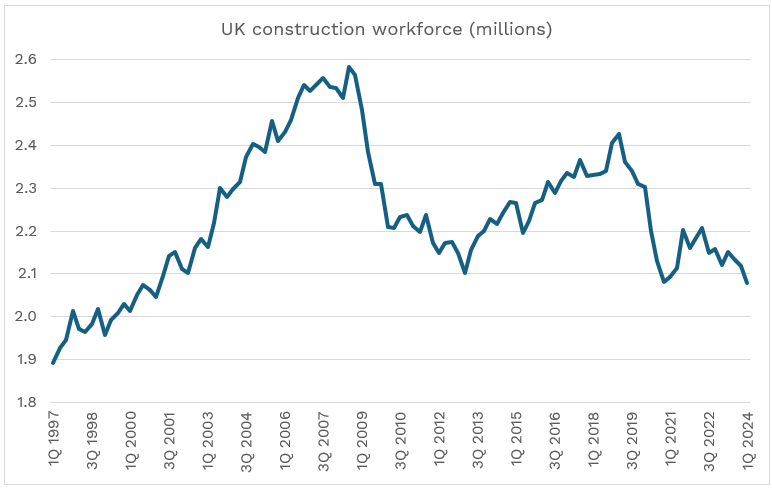

The Building Cost Information Service (BCIS) is calling on the new Labour government to address the skills shortage in the construction industry to help accelerate major housing and infrastructure projects.
Reportedly, the new government’s approach is to avoid reliance on overseas workers in the hope to lower net migration, while upskilling workers already in the UK and improving their working conditions.
However, BCIS points out that the government’s plans to boost vocational courses will take time to get workers on site while, according to a Construction Industry Training Board estimate, the industry needs another 152,000 workers to deliver Labour’s plans for 1.5 million new homes alone.
BCIS chief economist Dr David Crosthwaite said: “The degree to which Labour can support migration in the short-term at least, in order to meet the immediate needs of the construction industry, while also working on the longer-term ambition to grow the skills base in the UK, remains to be seen.
“In an ideal world you would be able to deliver projects with a pool of locally available labour, but that hasn’t been the reality in the UK for some time, and it’s not what the industry has experienced throughout its history.
“The new government’s plan to boost vocational courses will take time to get workers on site and we’re short by hundreds of thousands, taking other sectors into consideration alongside housing. What the government decides to do with the Immigration Skills List and how it responds to the increasing reports of shortages in various sectors will be crucial.”
BCIS said the UK had lost the European labour it had relied on post-Brexit, while the domestic workforce had declined since the pandemic. At the same time, demand has also reduced as the industry has been hit by successive shocks since Covid-19 – rampant inflation, sustained high borrowing costs, conflicts in eastern Europe and the Middle East.
While demand has been lower, the effects of a shrinking workforce has been less noticeable, but when demand picks up, these losses will be felt acutely.
 Source: ONS
Source: ONS
Total employment in construction stood at 2,078,926 people in the first quarter of 2024, with a split of just over one-third self-employed to just under two-thirds directly employed. This was 10% less than the total number of workers in pre-pandemic in the last quarter of 2019.
The number of self-employed workers decreased by 16.1% between the fourth quarter of 2019 and and the first one of 2024. Longer term, the construction workforce hasn’t really recovered since the financial crisis of the late 2000s.
 Source: ONS
Source: ONS
Data from the Department for Education shows apprenticeship numbers have generally fallen in recent years in subjects linked to construction, planning and the built environment.
Apprenticeship achievements in Construction, Planning and the Built Environment subjects, England
|
|
2018/19 |
2019/20 |
2020/21 |
2021/22 |
2022/23 |
2023/24 |
|
Intermediate apprenticeship |
6,616 |
5,548 |
4,989 |
4,406 |
5,156 |
4,848 |
|
Advanced apprenticeship |
3,033 |
2,601 |
2,522 |
2,110 |
2,033 |
1,705 |
|
Higher apprenticeship |
227 |
577 |
870 |
761 |
947 |
1,100 |
|
All apprenticeships |
9,876 |
8,726 |
8,381 |
7,277 |
8,136 |
7,653 |
Source: DfE
Part of Labour’s plan is also to ensure the minimum wage is a genuine living wage. The manifesto also pledged to change the remit of the independent Low Pay Commission to account for the cost of living and remove age bands, so all adults are entitled to the same minimum wage.
However, BCIS points out this alone is probably not the incentive that will lure droves of young people into construction apprenticeships.
More specifically, as announced in the King's Speech, Labour’s main method of boosting further education and apprenticeships is to establish Skills England, a body that will bring together businesses, training providers and unions with national and local government to ensure there is a workforce to deliver the Industrial Strategy.
The new government has also promised to transform Further Education colleges into specialist Technical Excellence Colleges, which will work with businesses, trade unions and local government to provide better job opportunities. In place of the Apprenticeships Levy, it said it will create a flexible Growth and Skills Levy, with Skills England consulting on eligible courses to ensure qualifications offer value for money.
Dr Crosthwaite said: “Aligning the needs of the industry with education provision is sensible but there’s an unavoidable lag from getting more young people into apprenticeships to getting them on site.
“Even the establishment of Skills England is set to take place in phases over the next year. We absolutely need a long-term plan, but the government can’t ignore what’s right in front of them now.”